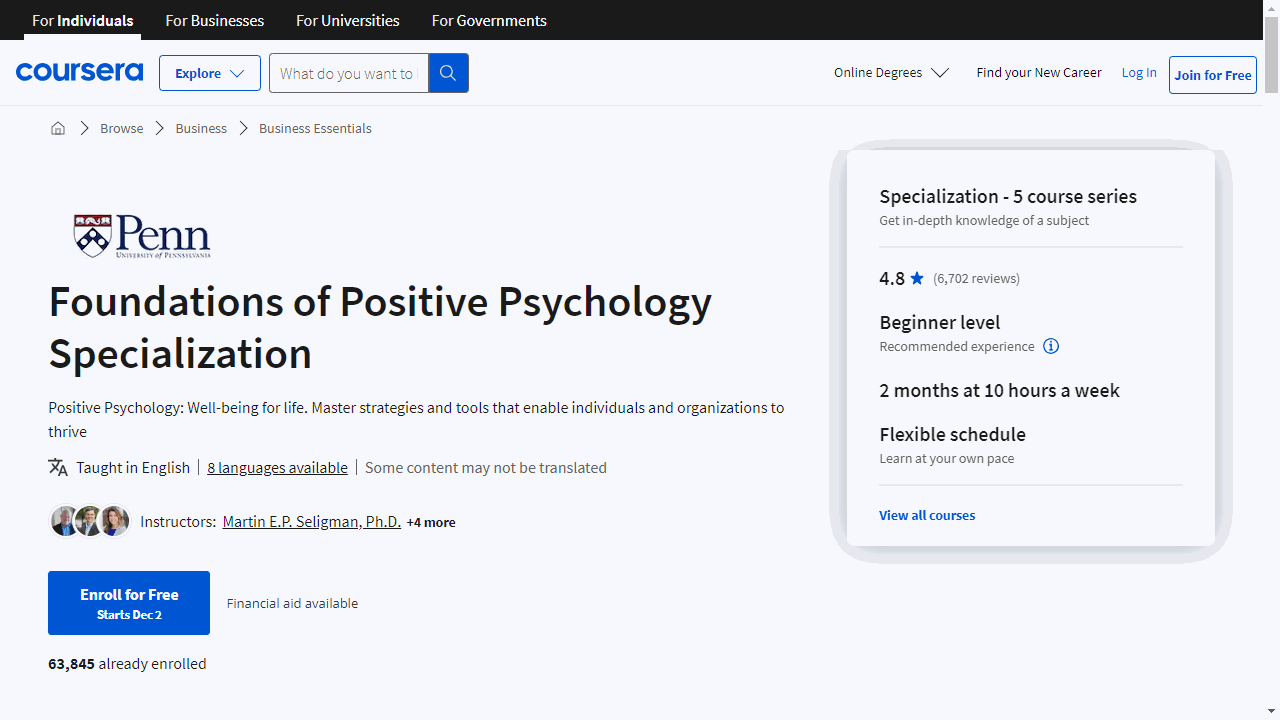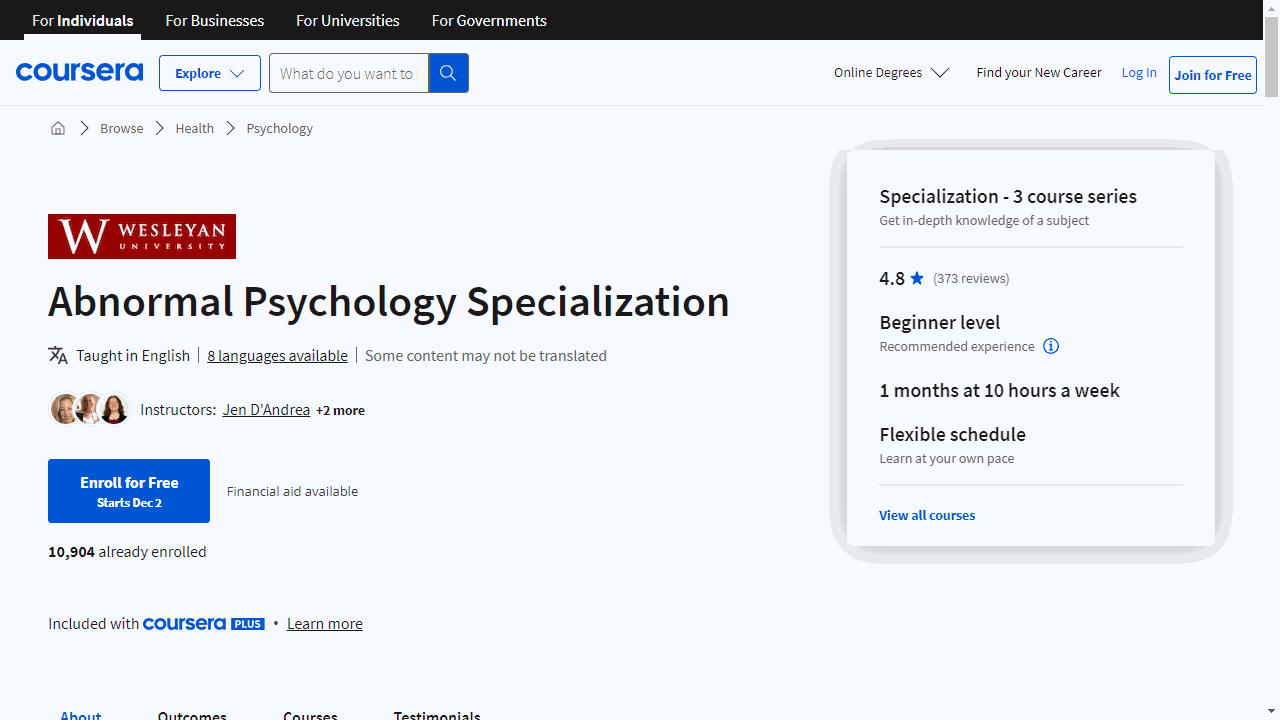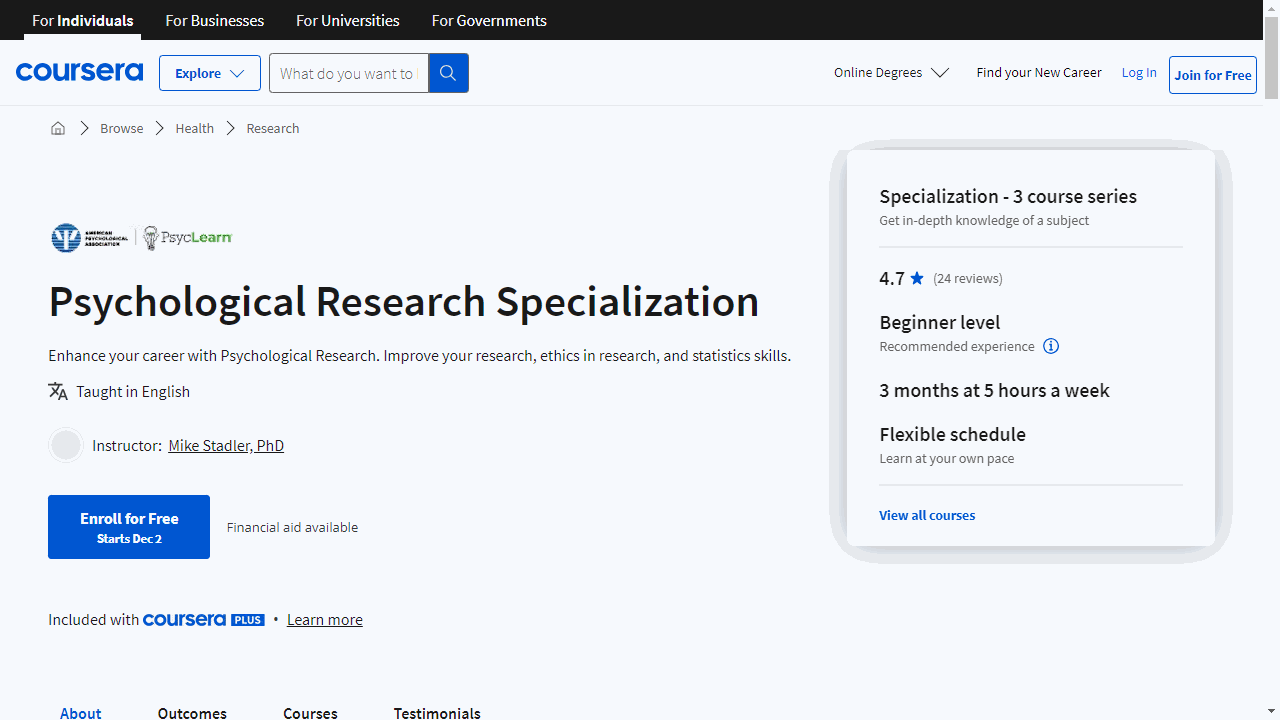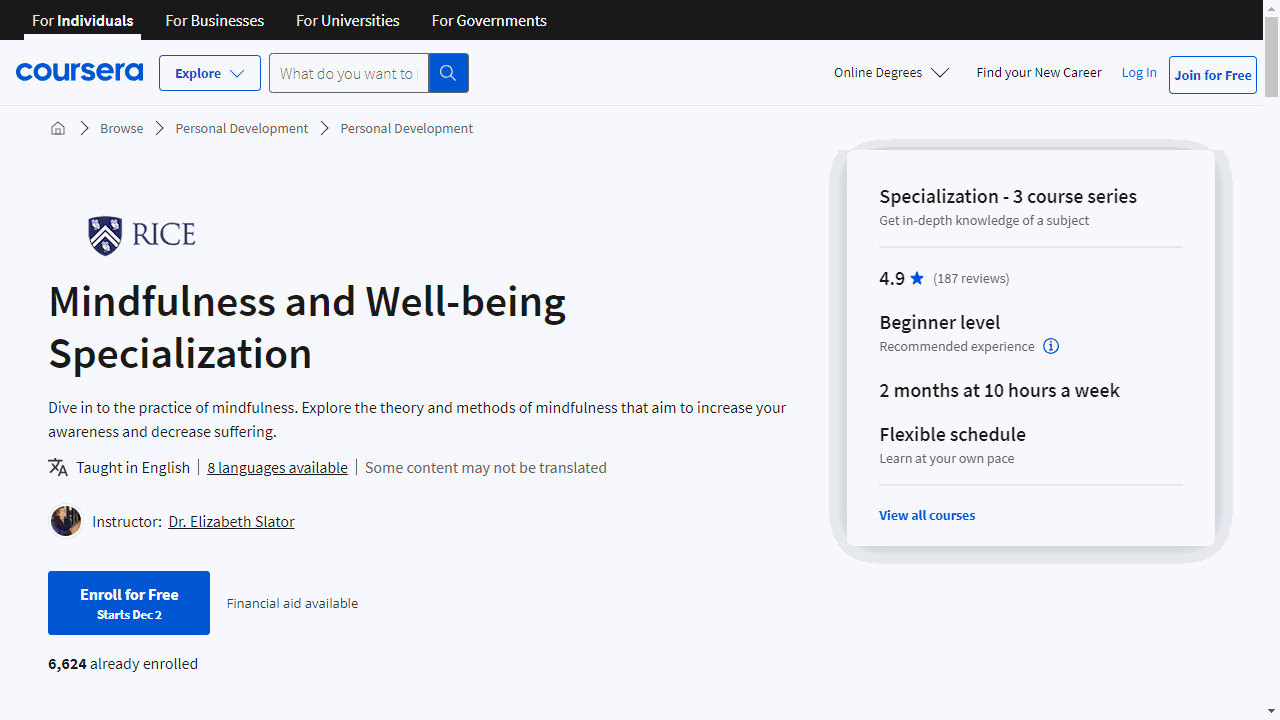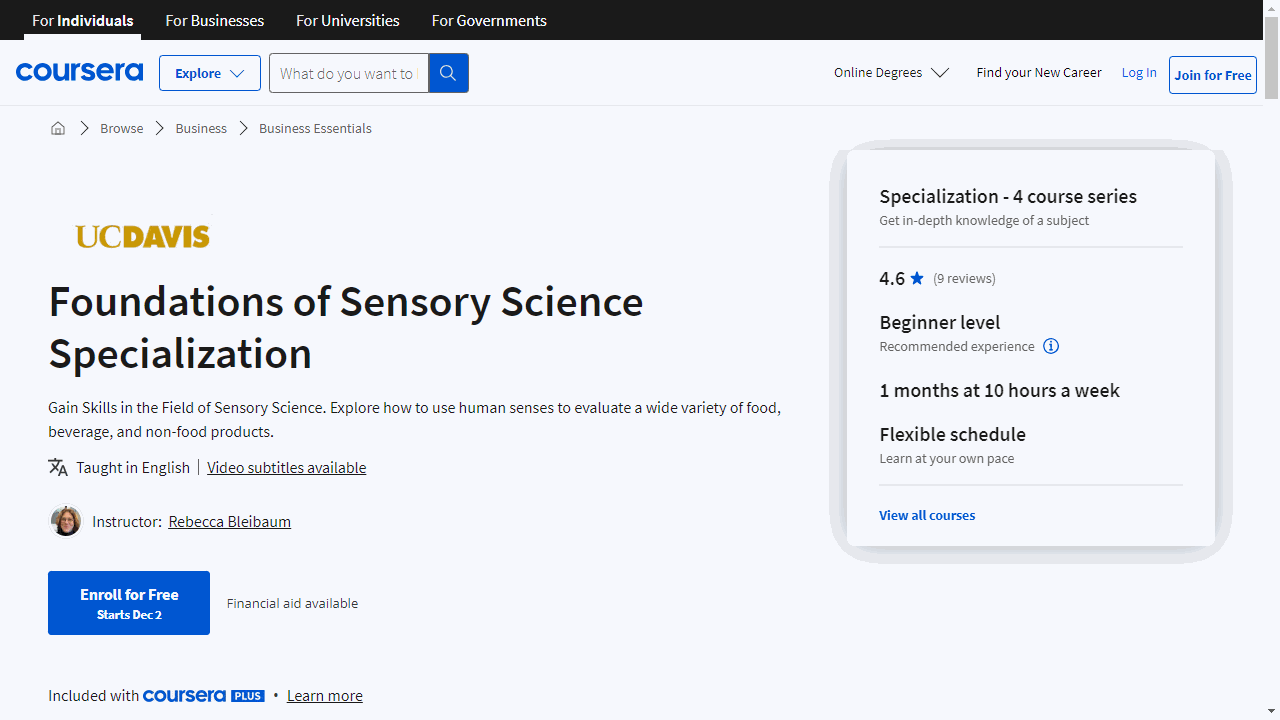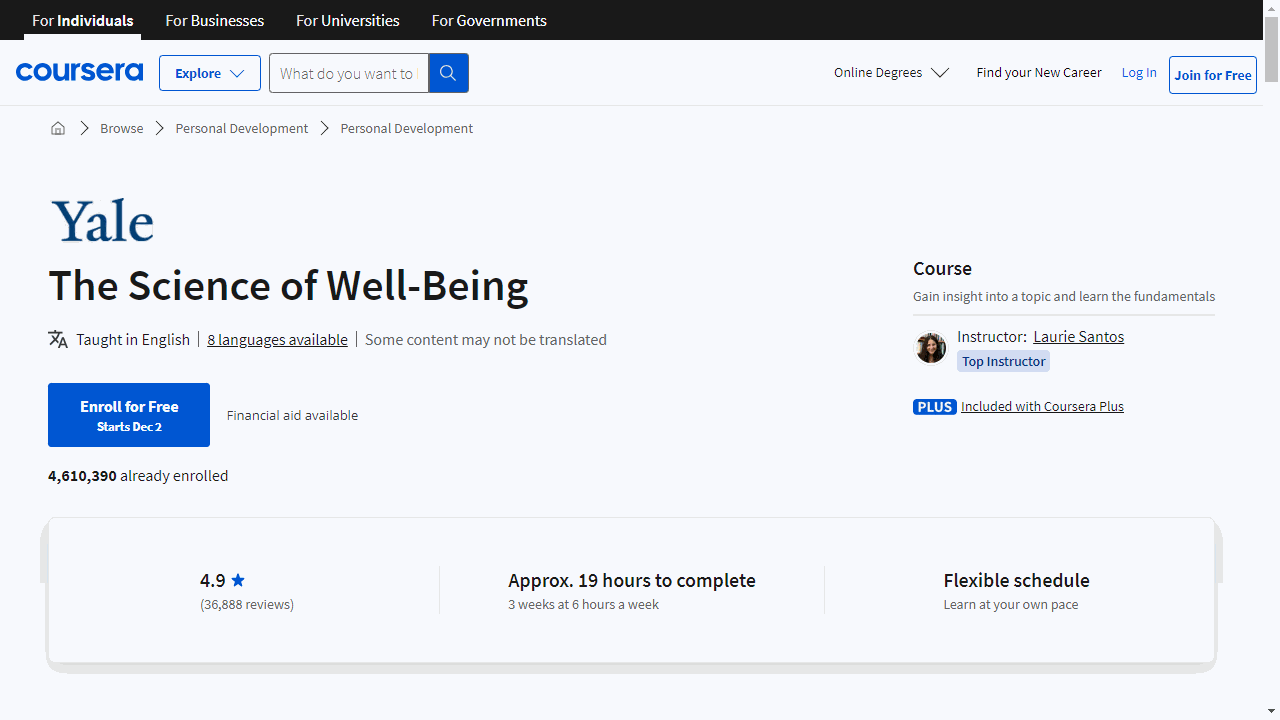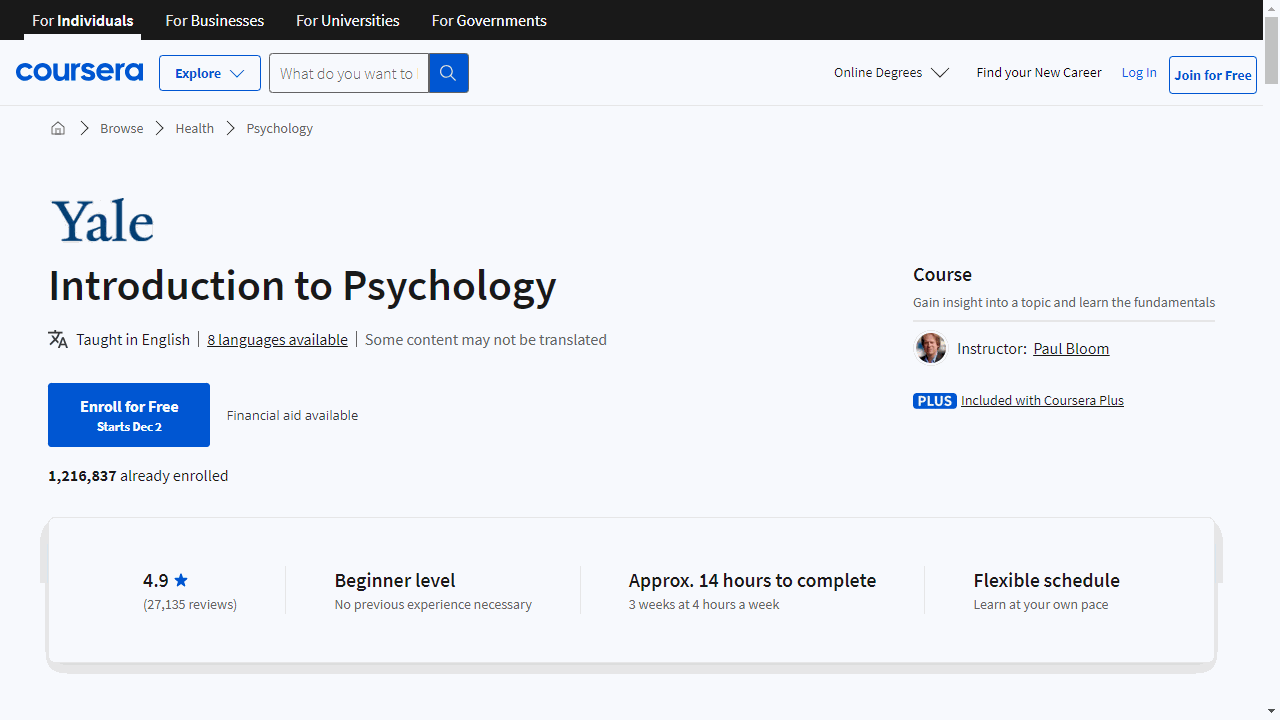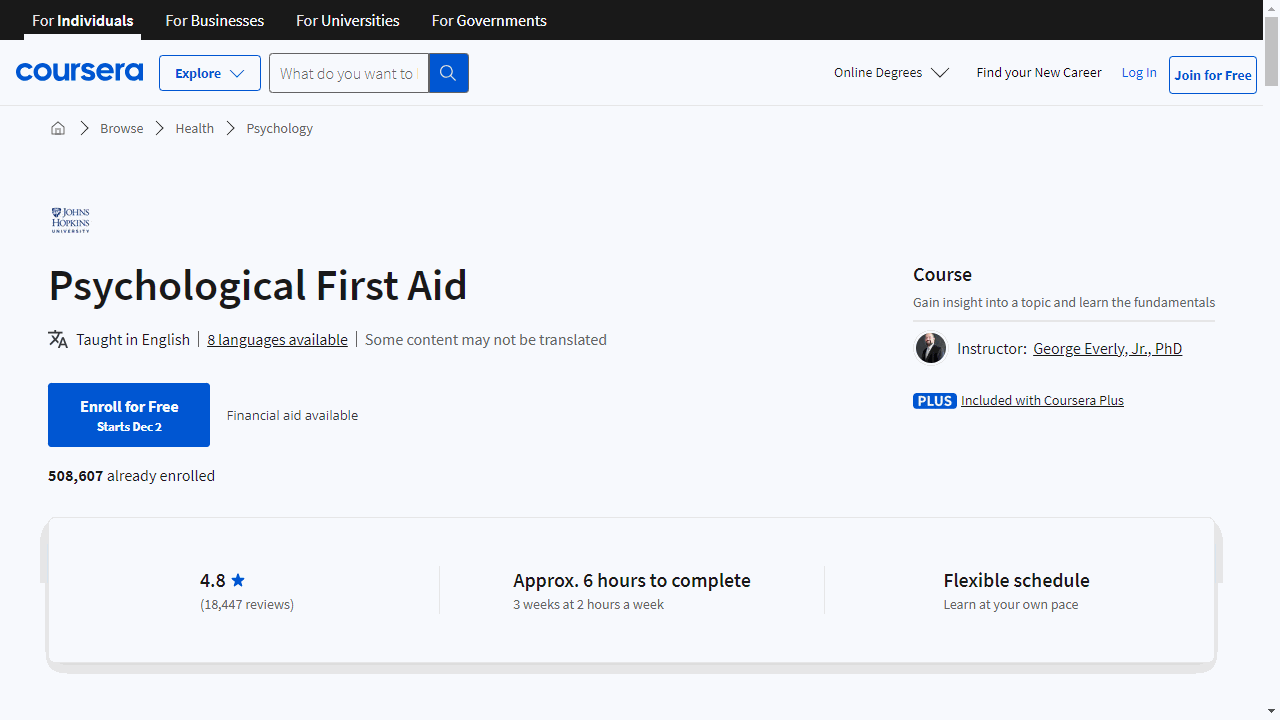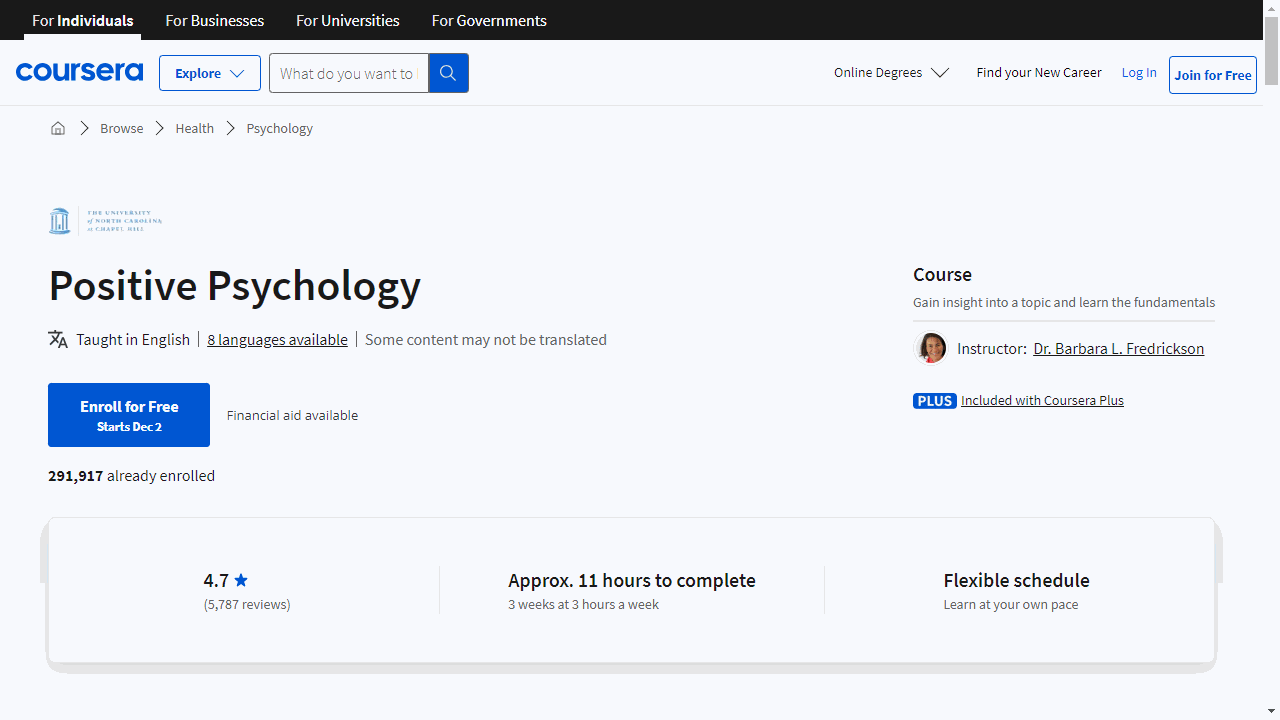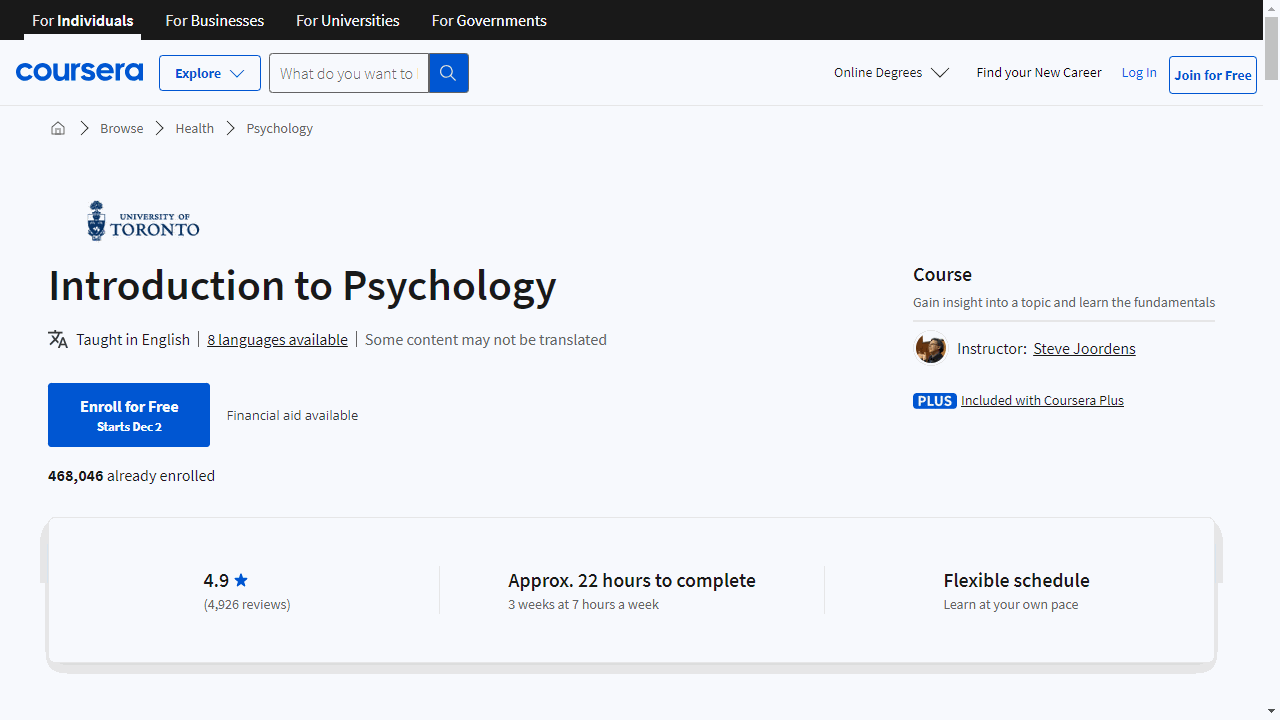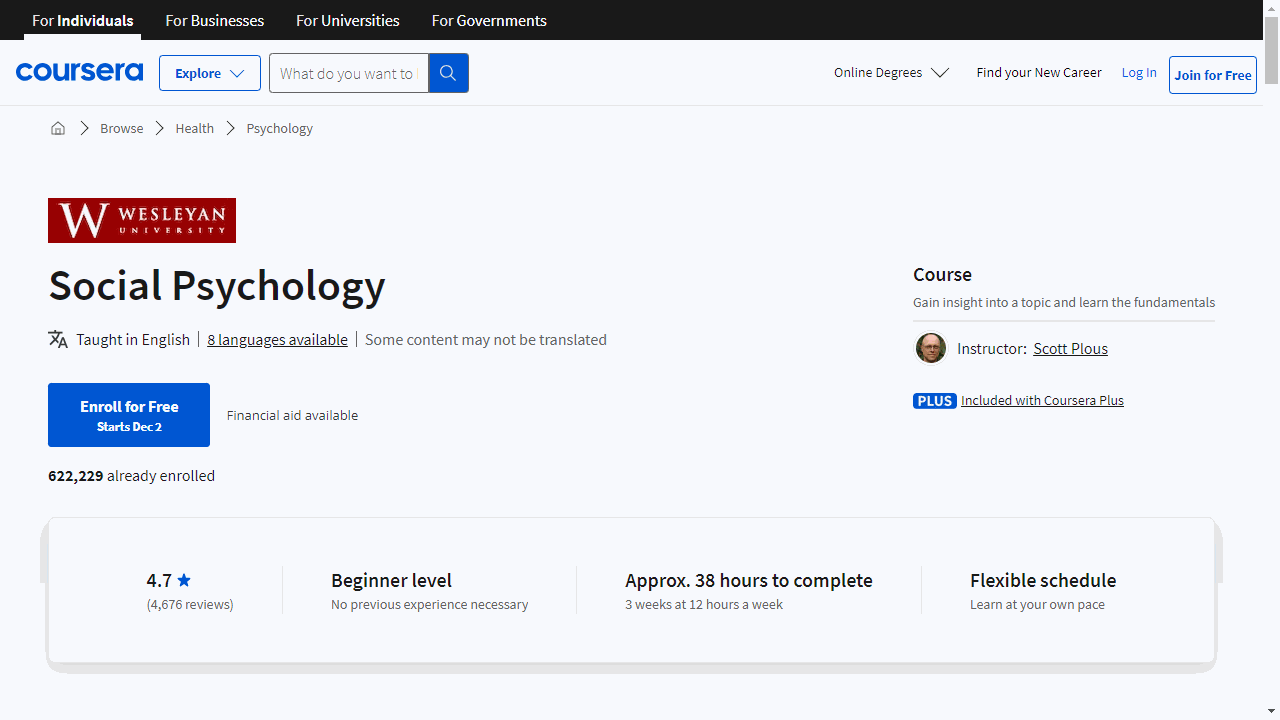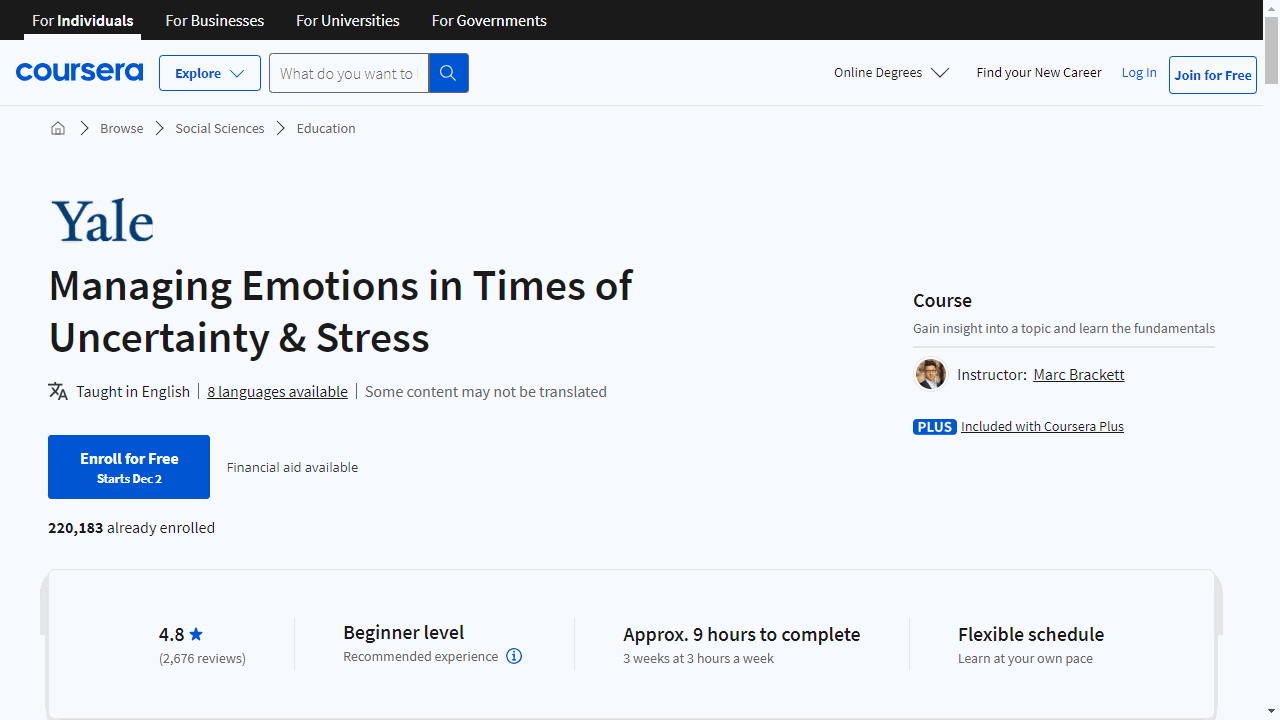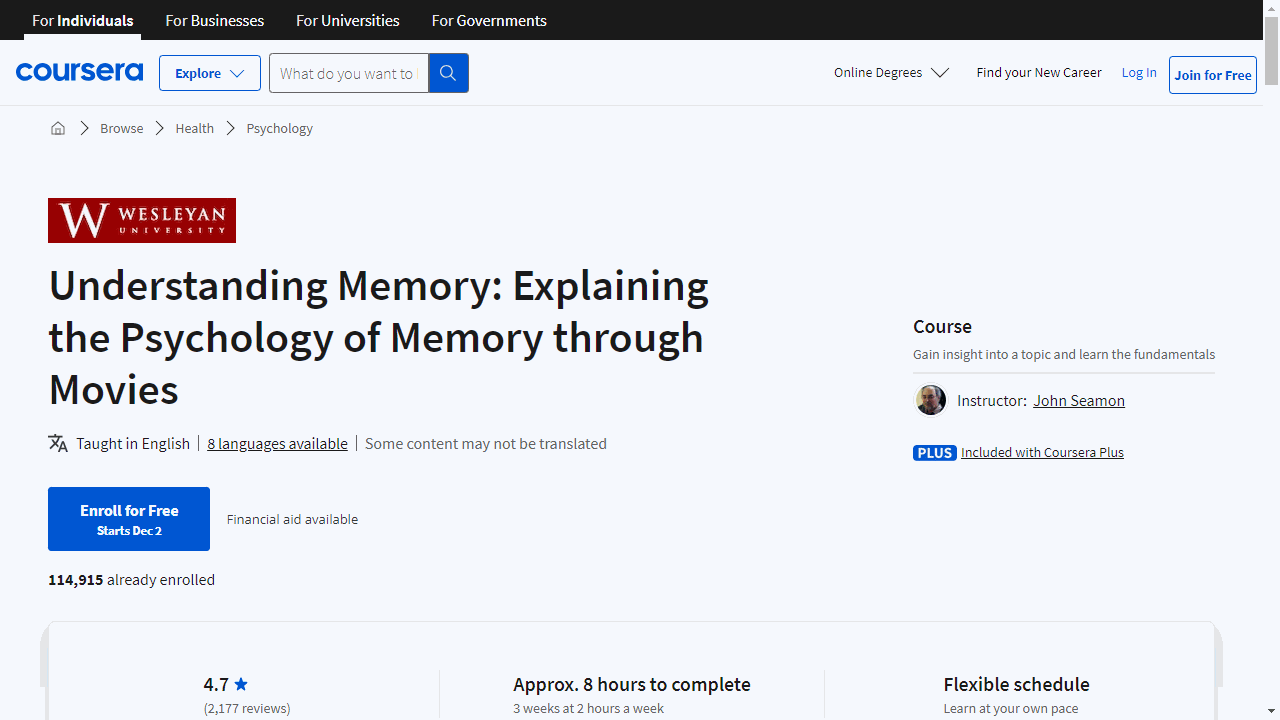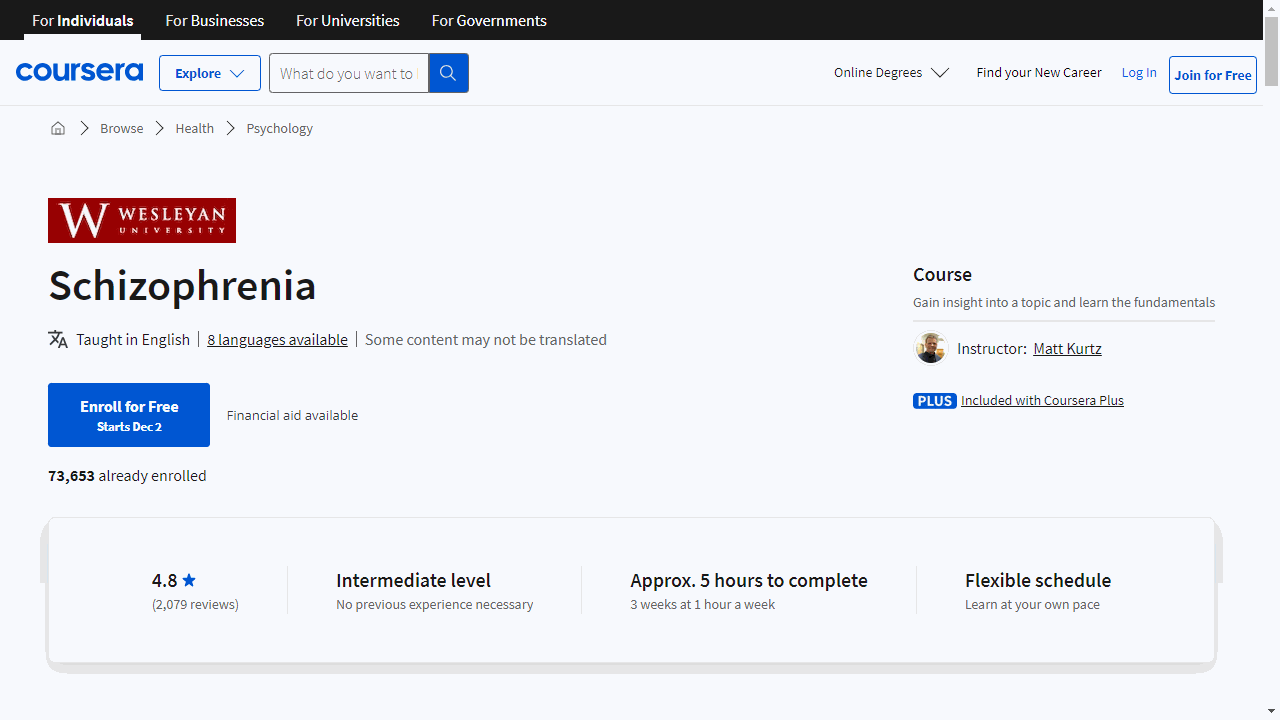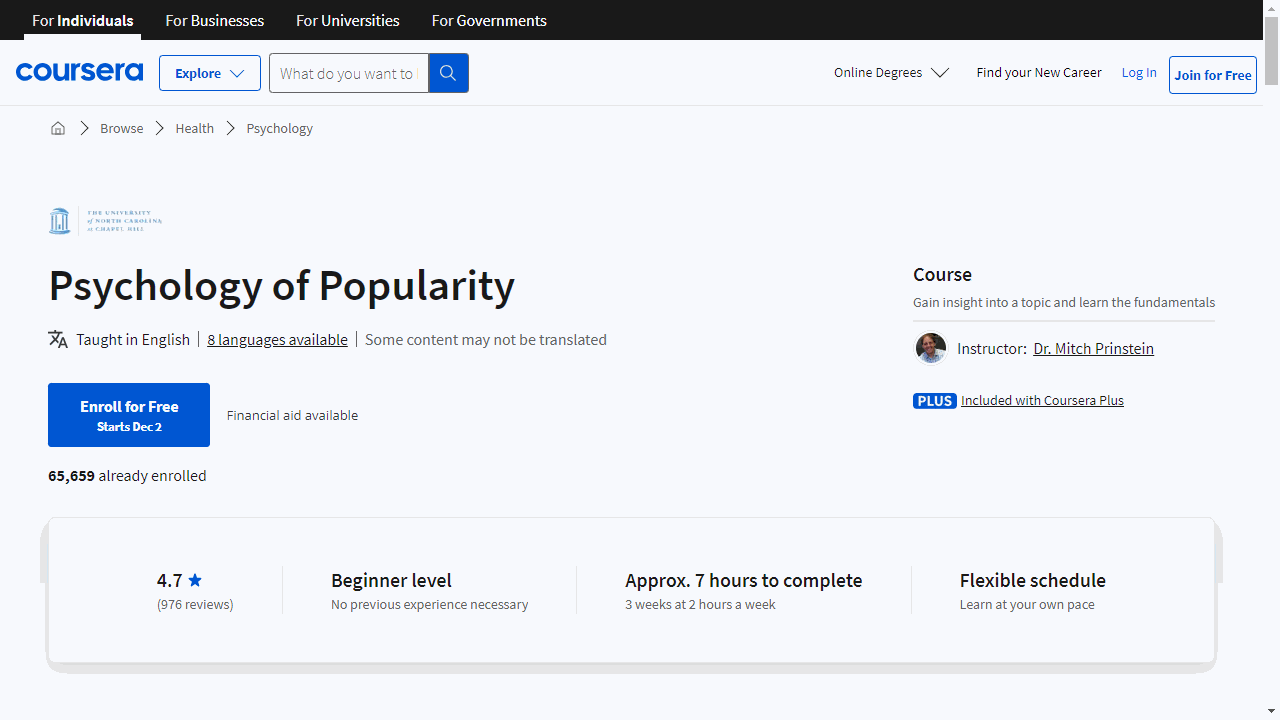Psychology is a fascinating field that delves into the human mind and behavior, exploring everything from memory and perception to emotions and social interactions.
Understanding psychology can be incredibly beneficial, whether you’re seeking personal growth, aiming for a career in mental health, or simply wanting to better understand yourself and others.
It can help you navigate complex relationships, make more informed decisions, and develop resilience in the face of challenges.
Finding the right psychology course on Coursera can be a daunting task, with a wide array of options to choose from.
You’re looking for a program that’s engaging, comprehensive, and taught by experts, but also aligns with your learning goals and interests.
For the best psychology course overall on Coursera, we recommend “The Science of Well-Being” by Dr. Laurie Santos, a renowned Yale professor.
This course, designed to actively improve your happiness, takes a practical approach to understanding well-being.
You’ll learn to identify and challenge negative thought patterns, explore the benefits of gratitude and kindness, and discover strategies for enhancing your overall sense of fulfillment.
While this is our top pick, there are many other excellent psychology courses on Coursera to explore.
Keep reading to discover more recommendations, tailored to specific areas of psychology, such as social psychology, cognitive psychology, and clinical psychology, as well as courses designed for different levels of learners.
Foundations of Positive Psychology Specialization
This series, offered by the University of Pennsylvania, kicks off with “Positive Psychology: Martin E. P. Seligman’s Visionary Science,” where you’ll explore the roots and advancements in Positive Psychology directly from its founder, Dr. Seligman.
No prior knowledge is needed, making it accessible if you’re new to the field.
In “Positive Psychology: Applications and Interventions,” Dr. James Pawelski takes you through practical strategies to enhance your well-being.
You’ll learn to identify and build upon your character strengths and set meaningful goals.
“Positive Psychology: Character, Grit, and Research Methods” offers a deep dive into research with Dr. Angela Duckworth.
You’ll gain insights into creating research questions and understanding various research methods, equipping you with the tools to scientifically study Positive Psychology.
Building resilience is the focus of “Positive Psychology: Resilience Skills,” where Dr. Karen Reivich introduces techniques to manage anxiety and foster positive emotions.
This course equips you with cognitive strategies to navigate life’s challenges more effectively.
The capstone, “Positive Psychology Specialization Project: Design Your Life for Well-being,” allows you to apply all you’ve learned.
Under Dr. Seligman’s guidance, you’ll design and evaluate a personal positive intervention, blending theory with practical application.
Completing the specialization earns you a certificate signed by the renowned instructors.
This series is ideal if you’re looking to understand happiness and resilience, whether for personal growth or professional application.
Abnormal Psychology Specialization
Starting with “Introduction to Abnormal Psychology,” you’ll gain a foundational understanding of psychological disorders, from mood to schizophrenia spectrum disorders.
You’ll learn to recognize signs of distress and how to approach conversations with empathy.
This course equips you with knowledge, not for self-treatment or to act as a therapist, but to understand and support others.
“History of Mental Illness” takes you through the evolution of psychiatric science, examining the impact of cultural and social factors on mental health.
You’ll explore conditions like depression and ADHD, considering both scientific progress and the real-life experiences of those affected.
This course encourages critical thinking about mental health’s past and present, challenging you to reconsider the concept of normality.
Finally, “Creating Behavioral Change” focuses on the principles behind altering mental and physical health behaviors.
You’ll be introduced to evidence-based interventions like motivational interviewing and cognitive behavioral therapies.
Through a personal behavior change project, you’ll apply what you’ve learned, though the course is not intended for clinical practice.
Psychological Research Specialization
This specialization is a comprehensive program that equips you with the essentials of psychological research, data analysis, and ethics.
Dive into “Methods for Quantitative Research in Psychology” to master research design and data interpretation.
This course is ideal if you’re keen on understanding the nuts and bolts of psychological studies and how findings are derived.
For a deep dive into the moral side of psychology, “Ethics of Psychological Research” is your go-to.
You’ll explore the significance of ethical practices and tackle the challenges of conducting research with integrity, both with humans and animals.
This course is crucial for ensuring your research upholds the highest ethical standards.
Lastly, “Statistics in Psychological Research” sharpens your statistical skills.
Learn to categorize and visualize data, grasp inferential statistics, and select the right tests for your research.
This course is essential for anyone looking to confidently navigate the statistical landscape of psychology.
Each course is packed with specific skills, from general statistics to clinical research methods, taught by field experts.
Mindfulness and Well-being Specialization
This is a practical series designed to enhance your understanding of mindfulness, a skill that can lead to increased well-being.
Start with “Mindfulness and Well-being: Foundations,” where you’ll grasp key mindfulness concepts, learn meditation basics, and improve your focus.
Through interactive exercises, you’ll explore the mind-body connection and learn to navigate emotions with resilience.
The course equips you with strategies to incorporate meditation into your daily routine.
Progress to “Mindfulness and Well-being: Living with Balance and Ease,” which delves into sustaining focus and presence.
It emphasizes stress management and self-care, teaching you to respond to challenges with resilience and cultivate compassion for yourself and others.
This course is designed to help you maintain balance in your daily life.
Lastly, “Mindfulness and Well-being: Peace in, Peace Out” offers a spiritual perspective on mindfulness.
It introduces meditations and reflective exercises aimed at expanding your consciousness and experiencing profound emotions like awe and wonder.
Each course is interactive, featuring guided meditations and discussions to ensure you can apply what you learn.
By engaging with these courses, you’ll develop valuable skills such as meditation and stress management, which are essential for mental health and well-being.
Foundations of Sensory Science Specialization
This specialization is a practical journey into how we perceive the world through our senses.
Start with “Introduction to Sensory Science,” where you’ll explore the field’s history and its role in product development and quality assurance.
This course lays the groundwork for understanding how sensory evaluation influences the consumer goods industry and beyond.
Then, “Sensory Science: The Senses” takes you on a deep dive into our sensory capabilities.
You’ll grasp the anatomy and physiology behind taste, smell, touch, sight, and hearing, and how these senses connect to the brain.
Engaging podcasts with field experts supplement your learning.
In “Sensory Science: Measuring the Senses,” you’ll discover how to quantify sensory experiences.
Learn about the brain’s interpretation of sensory data and master scientific methods like discrimination testing to measure and analyze senses.
Finally, “Sensory Science: Conducting Tests” equips you with the know-how to run sensory experiments.
You’ll understand the importance of the testing environment, learn to conduct duo-trio discrimination and consumer tests, and interpret results to make informed decisions.
Each course is designed to build your expertise, culminating in the ability to design and execute your own sensory research experiment.
The Science of Well-Being
This course, offered by Dr. Laurie Santos, a psychologist and Yale professor, is about actively improving your happiness.
You’ll start by debunking the G.I. Joe Fallacy and measuring your happiness with tools like the PERMA Profiler.
The course is practical, focusing on “rewirements” that help you form habits to enhance your well-being.
You’ll explore why things like money and a perfect body don’t always lead to happiness and learn about the importance of savoring, gratitude, kindness, and social connections.
You’ll tackle exercises on how to appreciate the little things and understand the mind’s annoying features that can hinder happiness.
Expert interviews provide deeper insights into these topics.
Sleep, exercise, meditation, and time management are also key components.
You’ll learn strategies to reset your expectations and adapt to new levels of happiness.
The course culminates in a final challenge where you’ll apply what you’ve learned and reassess your happiness levels.
By the end, if you’ve engaged with the material and challenges, you should have a clearer understanding of well-being and practical tools to maintain it.
Introduction to Psychology
If you’re eager to understand human behavior and apply psychological principles to your daily interactions, this course is tailored for you.
You’ll start with a clear guide on how to navigate the course effectively, ensuring you’re prepared to absorb the rich content.
Then you’ll dive into the brain’s complexities, learning about neurons and brain structures, and consider the debate between dualism and neuroscience.
This sets the stage for examining influential figures like Sigmund Freud, with his theories on development and defense mechanisms, and B.F. Skinner, known for his work on conditioning.
You’ll evaluate their contributions critically, gaining a balanced understanding of their impact on psychology.
The course also tackles developmental psychology, with a focus on how children grow and learn differently from adults, guided by theories like those of Piaget.
Language development is another key topic, where you’ll explore how we acquire and use language, and its influence on our thinking.
Perception, attention, and memory form another core part of the curriculum.
You’ll uncover how we interpret sensory information, concentrate on tasks, and store and retrieve memories.
The course even includes a TED talk by Joshua Foer, offering practical insights into memory improvement.
Emotions and social psychology are also covered in depth.
Learn about the evolution of emotions, the significance of facial expressions, and the intricacies of social interactions, including group dynamics and personal relationships.
As you progress, you’ll delve into personality, intelligence, and the interplay between genetics and environment.
The course doesn’t shy away from tough topics, addressing various mental health disorders and therapeutic approaches, providing you with a well-rounded perspective on clinical psychology.
Wrapping up, the course examines happiness and positive psychology, challenging you to rethink what happiness means and how it’s influenced by our perceptions and experiences.
Throughout the course, interactive elements and varied teaching methods ensure the content is engaging and applicable to real life.
Psychological First Aid
This course equips you with the skills to support individuals in crisis.
You’ll begin with an introduction to key terms and the history of PFA, setting a solid foundation for what’s to come.
A simulation video in Module 1 illustrates PFA in practice, aligning it with your personal objectives.
Module 2 hones in on reflective listening and rapport, essential communication skills for PFA.
Through interactive vignettes, you’ll practice techniques to ensure others feel heard and supported.
Assessing needs is the focus of Module 3.
Here, you’ll learn to identify what assistance is required, using vignettes to simulate real-life situations.
Prioritization is critical in crisis situations, and Module 4 teaches you to determine which actions to take first.
The “Beyond the Ashes” video and accompanying vignettes guide you through this process.
You’ll also learn intervention strategies, where you’ll see interventions in action and learn how to effectively aid those in distress.
The module ends by discussing disposition, helping you plan appropriate next steps for ongoing support, demonstrated through practical vignettes.
The course concludes with Module 5, emphasizing the importance of self-care for caregivers.
A summary lecture and closing remarks reinforce the course content.
Throughout, you’ll have access to “The Johns Hopkins Guide to Psychological First Aid,” a valuable resource for continued learning.
Pre and post-course surveys allow you to reflect on your progress.
Positive Psychology
This course zeroes in on how positive emotions can reshape your life.
You’ll kick off with the “Upward Spirals” concept and learn about ten key emotions that can lead to greater happiness.
You’ll delve into the “Broaden-and-Build Theory” by Fredrickson, which shows how positive feelings widen your perspective and help you develop new skills.
For a hands-on experience, you can craft a “Positivity Portfolio” to apply these ideas in your own life.
The course also examines how positivity can enhance resilience and influence entrepreneurship, featuring insights from Dr. Debby Stroman.
You’ll get to understand the “Science of Happiness” and gauge your own levels of positivity with a self-test.
Love takes center stage as you study “Positivity Resonance” and the practice of “Loving-Kindness,” which can deepen your connections and boost your well-being.
You’ll have the opportunity to practice “Loving-Kindness Meditation” to feel these effects yourself.
Positive psychology isn’t just about emotions; it has tangible health benefits.
You’ll explore how a positive outlook can lead to better heart health and a stronger immune system.
Interviews with experts like Kelly Stack provide deeper insights into these health connections.
The course also highlights the transformative power of gratitude, including its role in education, with perspectives from Patrick Akos.
Dr. Fredrickson’s TEDx Talk on love offers a thought-provoking view on this emotion’s impact.
With optional activities and additional scholarly resources, this course is designed to give you a practical and scientific understanding of happiness and well-being.
Introduction to Psychology
This is a comprehensive course by the University of Toronto that takes you from the birth of psychology to the latest in brain science and social behavior.
You’ll begin with the history of psychology, exploring the impact of pioneers like Freud.
This sets the stage for understanding the evolution of psychological thought.
The brain is your next stop.
Detailed lectures break down its complex regions, such as the frontal and parietal lobes, and explain their functions.
You’ll even learn about the effects of a split brain.
Perception is a key theme, too.
You’ll discover how we interpret our environment and develop self-awareness.
The course also delves into the fascinating concept of the “theory of mind.”
Behavior and learning are up next.
From the principles of behaviorism to the quirks of human memory, you’ll get insights into why we act and think the way we do.
This includes a look at common superstitions and the mechanisms of memory.
Social psychology is thoroughly covered.
You’ll understand the dynamics of conformity, authority, and group behavior.
The course also tackles the tough topics of prejudice and attraction, providing a deep dive into human interactions.
Mental health is not overlooked.
You’ll learn about diagnosing disorders, the intricacies of anxiety, and the challenges of conditions like schizophrenia.
The course also reviews various therapeutic approaches, from insight therapies to cognitive behavioral therapy.
Lastly, the course touches on the psychology of sleep, dreams, and hypnosis, as well as developmental stages and the complexities of relationships and intelligence.
Throughout the course, you’ll connect psychological concepts to current events, making the material relevant and applicable.
Additional resources and expert interviews enrich the learning experience.
Social Psychology
This course offers a comprehensive look at how we perceive our reality, make snap judgments, and influence each other’s thoughts and actions.
Starting with the basics, you’ll get acquainted with the Social Psychology Network and understand key concepts like confirmation bias and self-fulfilling prophecies.
You’ll also examine how quickly we form impressions of others and the impact of others’ perceptions on us.
As you progress, the course delves into the reasons behind our behaviors, the connection between attitudes and actions, and the phenomenon of cognitive dissonance.
You’ll gain insights into persuasion techniques and the mechanics of social influence through engaging lectures and practical assignments.
The curriculum tackles challenging topics through classic experiments on obedience and conformity, such as Milgram’s study and the Stanford Prison Experiment, offering a stark look at human behavior under pressure.
Group dynamics are also a focus, with discussions on prejudice, discrimination, and the subtle ways biases can form.
You’ll explore how to intervene in emergencies, understand aggression triggers, and consider psychology’s role in addressing global issues like terrorism and conflict.
The course wraps up with lessons on empathy, happiness, and the science behind romantic relationships.
If you’re eager for more, an honors assignment allows for deeper engagement with your peers.
With optional readings and videos supplementing the core material, and a glossary to support your learning, this Social Psychology course is structured to enrich your understanding of human behavior and its applications in everyday life.
Managing Emotions in Times of Uncertainty & Stress
Led by Dr. Marc Brackett, this course zeroes in on the crucial role emotions play in your daily life, from influencing your decisions to shaping your relationships.
You’ll start by understanding the basics of Social and Emotional Learning (SEL) and its relevance during challenging times.
The course introduces the Mood Meter, a tool to help you identify and articulate your emotions with precision.
As you progress, you’ll learn strategies for healthy emotion management.
This includes practical techniques like mindful breathing and developing action plans for emotional regulation.
The course emphasizes the importance of self-care through nutrition, exercise, and sleep, and how these contribute to emotional well-being.
The curriculum also guides you through positive thinking methods, such as positive self-talk and mindfulness, to enhance your mental resilience.
A significant portion of the course is dedicated to becoming an Emotion Scientist, which means becoming adept at recognizing and respecting others’ feelings.
This includes addressing personal biases and fostering inclusivity, skills that are increasingly valuable.
You’ll also discover a structured approach to emotion co-regulation, which is essential for supporting others in managing their emotions.
This is particularly useful for creating supportive environments at school or work.
The course concludes with the RULER approach, a comprehensive framework for applying SEL principles in various aspects of life.
Dr. Brackett encourages you to develop a personal plan to put these emotional intelligence skills into practice.
Throughout the course, you’ll engage in reflective action planning and have access to a wealth of additional articles and resources to deepen your understanding.
Understanding Memory: Explaining the Psychology of Memory through Movies
This course marries psychology with cinema, offering a creative approach to learning about memory.
You’ll kick off with an introduction that sets the stage for how movies can mirror real-life memory issues, illustrated by “50 First Dates.”
Then, you’ll delve into the basics of memory with “Finding Nemo,” and see how it functions daily.
The course uses a variety of films to illustrate different aspects of memory.
“The Princess Bride” helps explain storytelling and memory, while “After Life” and “Cast Away” explore the creation and significance of memories.
“Groundhog Day” offers a look at the role of memory in shaping the future, and “Crash” examines diverse methods of remembering.
You’ll also investigate where memories are stored with “Eternal Sunshine of the Spotless Mind,” and discover techniques used by memory experts through “Rain Man.”
As you progress, “The Kite Runner” and “Slumdog Millionaire” will aid in understanding how personal narratives are linked to memory.
Emotional connections to memory are highlighted in “Cinema Paradiso: The New Version” and “Titanic.”
The course also covers memory disorders, using “Desperately Seeking Susan” to discuss amnesia and “The Music Never Stopped” to explore memory loss from brain injuries.
“Memento” provides a case study on the most analyzed memory condition.
In the concluding module, aging and memory are addressed.
Films like “Cocoon” and “On Golden Pond” illustrate cognitive changes over time, while “Amour” and “Away From Her” delve into dementia and Alzheimer’s disease.
Finally, “The Bucket List” encourages a proactive approach to maintaining memory in later years.
Each section of the course is supplemented with optional readings for a deeper dive into the subject matter.
Schizophrenia
The course kicks off with an introduction to Schizophrenia, touching on the intriguing artwork of Louis Wain to illustrate the disorder’s impact.
You’ll delve into the prevalence, causes, and a range of symptoms, from hallucinations to emotional withdrawal.
Diagnosis and the neuroscience behind Schizophrenia come next, where you’ll learn about the brain’s role in the disorder.
Real-life demonstrations provide a clear picture of symptoms and recovery, making the condition more understandable.
Historical perspectives on diagnosis and treatment show how our understanding of Schizophrenia has evolved.
You’ll engage in discussions, analyzing cases from disorganized symptoms to recovery stories, fostering a deeper comprehension.
The course then guides you through the intricacies of human neuroanatomy and neuroimaging, revealing the brain’s structure and function in Schizophrenia.
The dopamine hypothesis, a key theory in the disorder’s biology, is explained in detail.
On the psychological front, you’ll explore cognitive deficits and social cognition, gaining insight into how Schizophrenia affects thought and interaction.
Treatments, from biological to cognitive therapies, are covered, emphasizing the potential for recovery.
Psychology of Popularity
This course offers a comprehensive look at how our need for acceptance influences our daily lives and long-term outcomes.
You’ll begin by examining whether our desire for popularity is ingrained in our DNA and how this affects us constantly.
The course will introduce you to concepts like “Hostile Attribution Bias” and “Rejection Sensitivity Bias,” which explain why some people feel targeted or easily snubbed.
You’ll engage with practical questions, such as determining a child’s popularity, and delve into the five categories of “Sociometric Popularity” to understand the nuances of social standing.
The course also reveals how popularity can shift dramatically with new environments and life stages.
Behavioral patterns that lead to quick popularity gains are discussed, alongside the negative aspects, such as the link between aggression and social rejection.
You’ll explore the role of physical attractiveness in youth popularity and debunk myths about intelligence and social success.
Parental influence on your social standing is another topic, as well as the predictive power of popularity on issues like delinquency and adult achievements.
The course doesn’t shy away from sensitive subjects, including the impact of popularity on health risks, sexual behavior, and even the likelihood of teen pregnancy.
By the end, you’ll have a nuanced understanding of the complexities of popularity, equipped with insights that are applicable to both personal and professional social dynamics.
